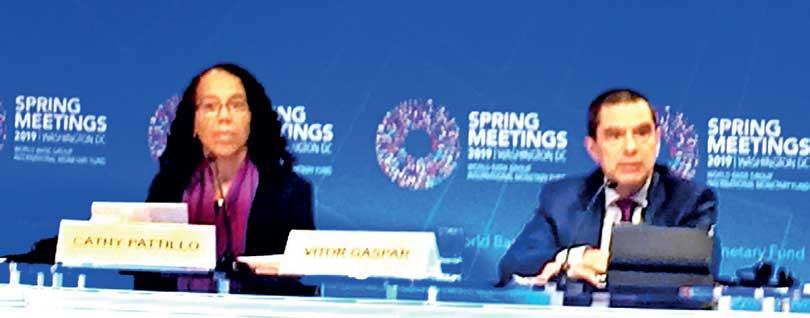Reply To:
Name - Reply Comment

From left: IMF Fiscal Affairs Department Assistant Director Cathy Pattillo and IMF Fiscal Affairs
Department Director Vitor Gaspar
By Indika Sakalasooriya in Washington DC
The International Monetary Fund (IMF) this week gave thumbs up to Sri Lanka’s 2019 budget, which was passed by Parliament last week, saying it strikes a fine balance between revenue-based consolidation and necessary social and capital spending.
“The 2019 budget, which was approved last week by the parliament, in our view strikes a very good balance between the priority of revenue-based consolidation while also making space for critical social or capital spending and also business-friendly measures that will support private investment and growth,” IMF Fiscal Affairs Department Assistant Director Cathy Pattillo told Mirror Business.
The 2019 budget was presented four months past the original scheduled date due to unexpected political developments, which rapidly snowballed into a fully-fledged constitutional crisis hindering the confidence in the island nation’s economy.
Finance Minister Mangala Samaraweera in a recent interview with the Daily Mirror however said, despite the calamitous politics, the direction of the budget presented in March was not fundamentally different from what was planned for November 2018.
Yet, the Rs.2, 500 allowance to State sector employees and some of the concessionary loan schemes announced for the newly-married to the migrant workers, are considered to be proposals targeting the upcoming key elections by the end of this year and early next year.
The government through budget 2019 expects to increase spending by 13 percent, while trying to keep the fiscal deficit at 4.4 percent of the Gross Domestic Product (GDP) this year, down from 5.3 percent in 2018.
The budget document also showed the government’s plan to raise Rs.450 billion through foreign commercial borrowing. The tax revenue expected to be raised for the year is Rs.2, 077 billion, up from Rs.1, 712 billion in 2018.
Meanwhile, according to Pattillo, Sri Lanka’s economy is stabalising and the IMF indicators are pointing out to some improvements in the economic growth in the beginning of 2019.
She also stressed that marching ahead with State-Owned Enterprises (SOE), reforms is critical for improving competiveness and medium term economic growth.
Sri Lanka’s economy slowed down to 3.2 percent in 2018, as negative political developments weighed on the economic sentiment, which led to the final quarter of the year registering a dismal growth of 1.8 percent.
According to IMF’s World Economic Outlook report, Sri Lanka’s economic growth is expected to pick up from 3 percent in 2018 to 3.5 percent in 2019, and then to 4 percent in 2020.
The Asian Development Bank last week forecast Sri Lanka’s economy to grow 3.6 percent this year. Meanwhile, the IMF Fiscal Monitor 2019 report showed that emerging market economies’ public debt levels have increased substantially undermining their growth potential.
The IMF estimates that since the beginning of the global financial crisis, public debt in emerging market economies has increased by an average 15 percent. Realisation of exchange rate and interest rate risks have also caused public debt levels to rise further in 2018 in several large emerging market economies.
Sri Lanka saw its interest burden rising over 20 percent of total revenue in 2018, making it extremely vulnerable to rollover risks as the country faces large financing needs.
The IMF estimates Sri Lanka’s total financing need to be around 18.1 percent of the GDP in 2018 and 15.5 percent in 2020.